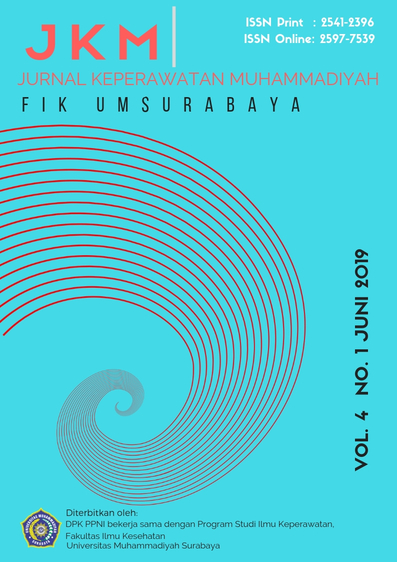Pengaruh Compression Stockings terhadap Obstructive Sleep Apnea (OSA) Pada Pasien Hemodialisis
DOI:
https://doi.org/10.30651/jkm.v4i1.2634Keywords:
compression stockings, fluid shifts, and hemodialysis, obstructive sleep apneaAbstract
Background: Obstructive Sleep Apnea (OSA) in hemodialysis patients results from a shift in the rostral fluid overnight. Compression Stocking is a fairly inexpensive therapy compared to other OSA therapies. Compression Stocking is leg stocking that use a pressure force of 20-30 mmHg, effective in preventing the accumulation of fluid that is installed in accordance with the patient's feet. Objective: to determine the effect of Compression Stockings on Obstructive Sleep Apnea (OSA) hemodialysis patients. Method: Search used several electronic databases such as Google Scholar, Proquest, and PubMed. The inclusion criteria in this literature study were quantitative research papers and experiments in English, full text, peer review, published between 2008-2018. Results: Searching for articles with predetermined keywords obtained 718 articles from the database, Google Schoolar obtained 550 articles, ProQuest obtained 68 articles, and PubMed obtained 100 articles. Articles were screened to 32 articles according to the purpose of the review with inclusion and exclusion criteria. After screening 15 articles that met the criteria were read intensively and then analyzed based on content analysis. Conclusion: An overnight rostral fluid shift is one of the factors contributing to the pathogenesis of OSA in hemodyalysis patients. Compression Stocking can be considered as an alternative therapy to prevent fluid retention in the legs and overnight shift to the neck thus providing evidence for a new therapeutic approach to OSA.References
Abuyassin, B., Sharma, K., Ayas, N.T., and Laher, I. (2015). Obstructive Sleep Apnea and Kidney Disease: A Potential Bidirectional Relationship?. J Clin Sleep Med. 11(8): 915–924.
Adeseun, G.A and Rosas, S. E. (2010). The Impact of Obstructive Sleep Apnea on Chronic Kidney Disease. Current hypertension reports.
Ahmad,S., Gupta, M., Gupta, R., and Dhyani, M. (2011). Prevalence and Correlates of Insomnia and Obstructive Sleep Apnea in Chronic Kidney Disease. N Am J Med Sci. 2013 Nov; 5(11): 641–646.
Bowen, A. J., Nowacki, A. S., Kominsky, A. H., Trask, D. K., Benninger, M. S., Bryson, P. C. (2018). Voice and swallowing outcomes following hypoglossal nerve stimulation for obstructive sleep apnea. Am J Otolaryngol.
Cahyaningsih, D. (2011). Panduan Praktis Perawatan Gagal Ginjal. Yogyakarta: Cendekia Press.
Cella D. (2007). Manual of the Functional Assessment of Chronic Illness Therapy (FACIT) Measurement System. Center on Outcomes, Research and Education (CORE), Evanston Northwestern Healthcare and Northwestern University, Evanston IL, Version4.
Dempsey, J. A., Veasey, S. C., Morgan, B. J., and . O'Donnell, C.P. (2010). Pathophysiology of Sleep Apnea. Physiol Rev. 90(1): 47–112.
Gerogianni, S.K., dkk. (2014). Concerns of patient in dialysis: a research study.Health Science Jurnal.Volume 8, 423-437
Kemenkes RI. (2013). Riskesdas : Prevelensi gagal ginjal kronik di Indonesia.
Knappe, S.W, Sonnesen, L. (2018). Mandibular positioning techniques to improve sleep quality in patients with obstructive sleep apnea: current perspectives. Nat Sci Sleep.
Mason, M., Cates, C. J., Smith, I. (2015). Effects of opioid, hypnotic and sedating medications on sleep-disordered breathing in adults with obstructive sleep apnoea. Cochrane Database Syst Rev.
Ogna, V. F., Ogna, A., Pruijm, M., Bassi, I., Zuercher, E., Halabi, G., et al . (2015). Prevalence and Diagnostic Approach to Sleep Apnea in Hemodialysis Patients: A Population Study. Biomed Res Int.
Ogna, A., Ogna, V. F., Mihalache, A., Pruijm, M., Halabi, G., Phan, O., et al. (2015). Obstructive Sleep Apnea Severity and Overnight Body Fluid Shift before and after Hemodialysis. Clin J Am Soc Nephrol. 10(6): 1002–1010.
Prince, S.A., dan Wilson, L.M., (2006). Patofisiologi Konsep Klinis Proses-Proses Penyakit.ed 6th Volume 2. Jakarta: EGC
Redolfi. S., Arnulf. I., Pottier, M., Bradley, T. D., Similowski, T. (2011). Effects of venous compression of the legs on overnight rostral fluid shift and obstructive sleep apnea. Respir Physiol Neurobiol. 15;175(3):390-3.
Redolfi, S., Arnulf, I., Pottier, M., Lajou, J., Koskas, I., Bradley, T.D., and Similowski, T . (2011). Attenuation of Obstructive Sleep Apnea by Compression Stockings in Subjects with Venous Insufficiency. American Journal of Respiratory and Critical Care Medicine
Rambod, M & Raffi, F. (2010). Perceived sosial support and quality of life in. Iranian hemodialysis patients. Journal of Nursing Scholarship; Third. Quarter 2010; Volume 42, 3
Wali, S. O., Alkhouli, A., Howladar, M,. Ahmad, I., Alshohaib, S., Ghamdi, S., and Krayem. A., (2015). Risk of obstructive sleep apnea among Saudis with chronic renal failure on hemodialysis. Ann Thorac Med. 2015 Oct-Dec; 10(4): 263–268
White, L. H., Lyons, O. D., Yadollahi, A., Ryan, C. M., Bradley, T.D. (2015). Effect of below-the-knee compression stockings on severity of obstructive sleep apnea. Sleep Med. 2015 Feb;16(2):258-6
Downloads
Published
Issue
Section
License
- Penulis tetap memegang hak atas karyanya dan memberikan hak publikasi pertama kepada jurnal ini yang secara simultan karya tersebut dilisensikan di bawah:Â Creative Commons Attribution-ShareAlike 4.0 International (CC BY-SA 4.0)













